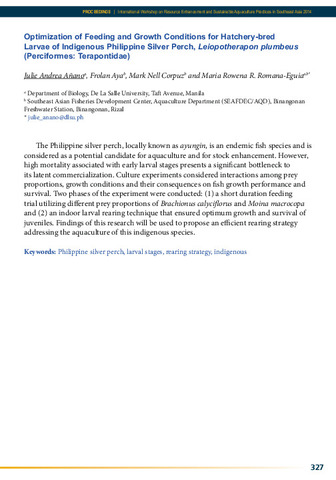Rearing silver therapon Leiopotherapon plumbeus (Teleostei: Terapontidae) larvae using euryhaline rotifers as starter food
| dc.contributor.author | Aya, Frolan | |
| dc.contributor.author | Nillasca, Vicar Stella N. | |
| dc.contributor.author | Garcia, Luis Maria | |
| dc.date.accessioned | 2022-01-20T08:08:23Z | |
| dc.date.available | 2022-01-20T08:08:23Z | |
| dc.date.issued | 2021-12 | |
| dc.identifier.citation | Aya, F. A., Nillasca, V. S. N., & Garcia, L. M. B. (2021). Rearing silver therapon Leiopotherapon plumbeus (Teleostei: Terapontidae) larvae using euryhaline rotifers as starter food. Philippine Agricultural Scientist, 104(4), 388-395. | en |
| dc.identifier.issn | 0031-7454 | |
| dc.identifier.uri | http://hdl.handle.net/10862/6284 | |
| dc.description.abstract | The silver therapon Leiopotherapon plumbeus is an important but dwindling freshwater food commodity in Philippine freshwater habitats. The influence of feeding regimes on growth performance and survival of first-feeding silver therapon larvae fed euryhaline rotifers (Brachionus rotundiformis and B. plicatilis) as starter food was examined. Larvae at 2 days post-hatch (DPH) (1.93 ± 0.07 mm; 200 larvae/basin) were initially reared on rotifers for 12 days followed by Artemia nauplii from 14 to 35 DPH as follows: (A) B. rotundiformis from 2-13 DPH; (B) B. rotundiformis from 2-7 DPH and Moina micrura from 8-13 DPH; and (C) B. plicatilis from 2-13 DPH. After 35 days of rearing, mean survival rates were significantly higher in larvae fed B. rotundiformis (69.2%) than those co-fed B. rotundiformis and M. micrura (34.6%) or B. plicatilis alone (26.3%). Higher ingestion rates were observed for B. rotundiformis-fed larvae (1.6 ± 0.5 to 4.4 ± 0.5 ind larvae-1) than larvae fed B. plicatilis (0.0 to 3.2 ± 0.8 ind larvae-1) during the critical initial feeding stage. However, larvae fed B. plicatilis (20.75 ± 0.48 mm) were significantly longer than those fed B. rotundiformis alone (15.62 ± 0.40 mm) or co-fed B. rotundiformis and M. micrura (18.57 ± 0.58 mm). The fastest growth was observed in larvae fed B. plicatilis, with length increment (LI) and specific growth rate (SGR) of 18.8 mm and 6.8% day-1, respectively. Eye diameter, head length, snout length and pre-anal length increased but were not affected when larvae were fed two rotifer species. These results demonstrate that feeding euryhaline rotifer B. rotundiformis from 2 to 13 DPH followed by Artemia is a suitable feeding regime for better survival of silver therapon larvae under laboratory rearing conditions. | en |
| dc.language.iso | en | en |
| dc.publisher | College of Agriculture and Food Science, University of the Philippines Los Baños | en |
| dc.subject | first feeding | en |
| dc.subject | Teleostei | en |
| dc.subject | Terapontidae | en |
| dc.subject | Euryhaline | en |
| dc.title | Rearing silver therapon Leiopotherapon plumbeus (Teleostei: Terapontidae) larvae using euryhaline rotifers as starter food | en |
| dc.type | Article | en |
| dc.citation.volume | 104 | |
| dc.citation.issue | 4 | |
| dc.citation.spage | 388 | |
| dc.citation.epage | 395 | |
| dc.citation.journalTitle | Philippine Agricultural Scientist | en |
| dc.subject.asfa | feeds | en |
| dc.subject.asfa | feeding | en |
| dc.subject.asfa | growth | en |
| dc.subject.asfa | larvae | en |
| dc.subject.asfa | feeding experiments | en |
| dc.subject.asfa | live feeds | en |
| dc.subject.asfa | water quality | en |
| dc.subject.scientificName | Terapontidae | en |
| dc.subject.scientificName | Leiopotherapon plumbeus | en |
| dc.subject.scientificName | Brachionus plicatilis | en |
| dc.subject.scientificName | Artemia | en |
| dc.subject.scientificName | Rotifera | en |
| dc.subject.scientificName | Moina micrura | en |
このアイテムのファイル
| ファイル | サイズ | フォーマット | 閲覧 |
|---|---|---|---|
|
このアイテムに関連するファイルは存在しません。 |
|||
このアイテムは次のコレクションに所属しています
-
Journal Articles [1258]
These papers were contributed by Department staff to various national and international journals.




